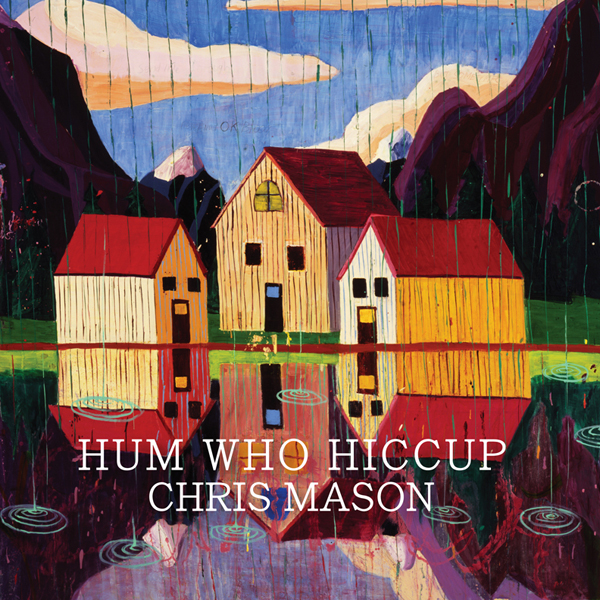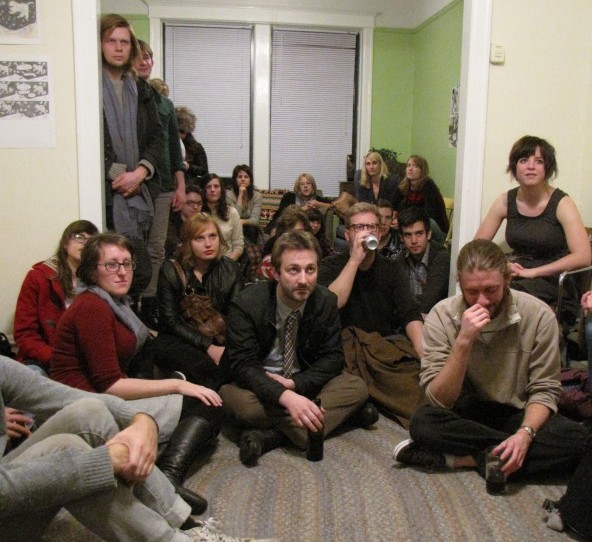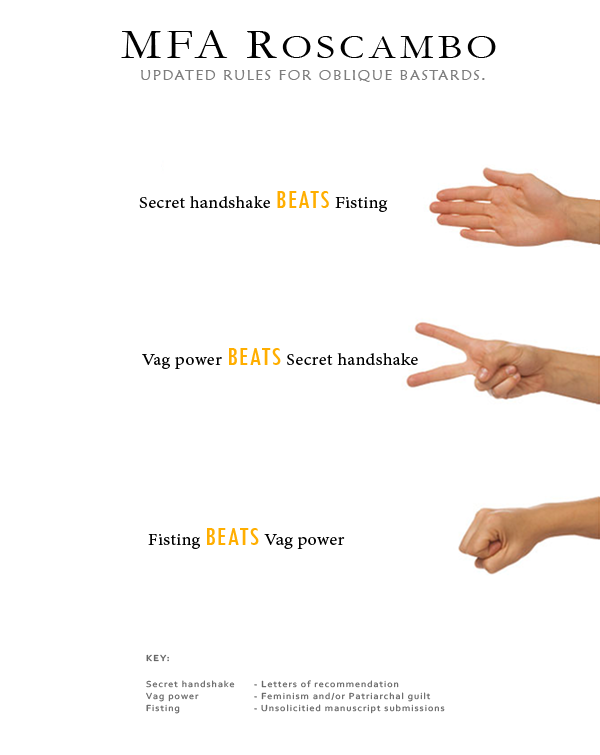Your best guess: what percentage of books in your personal library that you have read do you remember enough to feel like you actually read them?
An Interview with Cassandra Troyan about the EAR EATER Reading Series
Cassandra Troyan & Sara Drake run a (somewhat) monthly reading series out of their apartment in Chicago. Having attended a few of the readings myself, I found myself particularly interested in what Troyan & Drake have accomplished: each reading series brings together (mostly young) people from various backgrounds (though mostly related to the arts/humanities) into an enclosed space to hear 4 or 5 readers. The events straddle the line between house party & art opening (and indeed, at one event there was art displayed on the walls), but it’s the words that get center stage here. I sent Cassandra a few questions through Facebook about the reading series, and hey here they are:
M: I am always interested in the way that people who take a D-I-Y approach to life manage to turn private spaces (the home, for instance) into public, communal spaces. Living in a “college town,” as I’ve spent my entire life doing, it seems more likely to find people at a huge house party than a bar or “club.” When it comes to event spaces, I also often find the non-affiliated to be more comfortable, even more rewarding. People have art shows in their apartment to escape the realm of an institutionalized sense of curation, people have bands play in basements to crowds of many to avoid booking agents and dealing with venue crap, and now you & Sara Drake have opened up your apartment as an area for readings, something that seems to happen most often at bars or academic spaces. What circumstances found you guys deciding to start the Ear Eater reading series?
Cassandra: Much of the circumstances you mention are similar to the experiences and situations shared by Sara and I, which all influenced the desire to create EAR EATER. I went to undergrad at the behemoth institution, Ohio State University, in the notoriously college-run town of Columbus, Ohio. I think precisely because of this, most of my social interactions turned more traditionally private spaces into sites of collectivity.
Chris Mason in HUM WHO HICCUP
 Oh sweet, the new book from Narrow House is out and shipping — Hum Who Hiccup by Chris Mason. He’s one of my favorite people poets in the people universe, so smart and nice and a relaxed scholar of what’s happening. And what’s happening is so much because of what he’s doing and what he’s done, like playing music in one of my top favorite bands, Old Songs, which performs their own translations of ancient Greek poetry. An Old Songs show is worth a trip to Baltimore.
Oh sweet, the new book from Narrow House is out and shipping — Hum Who Hiccup by Chris Mason. He’s one of my favorite people poets in the people universe, so smart and nice and a relaxed scholar of what’s happening. And what’s happening is so much because of what he’s doing and what he’s done, like playing music in one of my top favorite bands, Old Songs, which performs their own translations of ancient Greek poetry. An Old Songs show is worth a trip to Baltimore.
The first mention of the book by Michael Lally is up. I think there will be a lot more buzzing soon. I got a sneak peak and can attest that it’s a beautiful book, outside and in. The poems are funnier than they ought to be (there’s a tribute to a fart, I think), but they work because Mason has perfect pitch. And Justin nailed a challenging design — challenging because some of Mason’s poems are circular because who said words have to sit on a line?
Or do anything else ordinary? Evidence of such postulatin’ below the fold, with Chris Mason reading at In Your Ear (introduced by the ambulant Buck Downs): READ MORE >
Beefin’
I wrote an article about editing and some of my past favorite submissions (favorite as in “was this handwritten paper submission composed with human blood? ha ha. wait…no seriously look…this submission REALLY IS written in dried human blood, wash your hands!” or “poem about a snowflake written in the shape of a snowflake just in time for Christmas,” or “story from guy in prison who in his cover letter asks us to mail the money he’ll get if his story is published to the address of a given drug dealer below, explaining that the funds will be an installment payment towards the crack cocaine tab he’d accrued at the time of his incarceration” or even “travel back in time to kill Hitler only to end up falling in love/sexing him, so much sex that he becomes docile and happy, except you then get pregnant with his hitlerspawn who grows up to do exactly what his father would’ve done even though his name is Wilhelm, sometimes the best intentions don’t get the best results” favorite). But also about the pure, kitsch-less favorites as in “this story makes me see Pushcarts rain from the sky.”
Also, I will be reading this Saturday at Elliott Bay Book Company in Seattle at 7pm
Also, I keep trying to quit Taco Bell beef but it’s like that Taylor Dane song “Love Will Lead You Back.” Ain’t that the meximelt truth.
httpv://www.youtube.com/watch?v=n6A0xivfIMo
Your best guess: what percentage of books in your personal library have you read?
To Write As a Woman Is Political

I started writing this on my personal blog but then I decided I would post it here. I got the most gorgeous letter today from someone who read my latest short story, “Strange Gods,” in the current issue of Black Warrior Review. In her letter, she talked about how important the story was to her and things so flattering I kind of choked a little. It was such a, I don’t know what it was, it was something to have a complete stranger I have never interacted with say, “your writing is important; your writing reached me.” She she thanked me for reminding her to fight the good fight. I have a point here that is not self-indulgent, I promise.
I receive the most correspondence about the stories I write about women, stories that are often intense and dark and intimate. Most of these letters come from women who thank me for telling these kinds of stories, for bringing a kind of testimony to certain women’s experiences and when I’m starting to lose faith in my writing, it is really humbling to hear that sort of thing. It reminds me that my stories may not reach everyone but they do reach some people and I think that’s what most of us want, to reach people, to make them feel, to make them bear witness.
There are a wide range of women’s experiences. A woman’s story is not just about violence or rape or the loss of an unborn or barely born child though, admittedly, those themes are the foundation of most of my writing. There are happier stories, painful stories, easier stories, different stories that are just as complex and necessary and important. As far as I’m concerned, any story that speaks to a woman’s experience is important. Now, please don’t misinterpret what I am saying. To affirm one kind of story is not to disaffirm another. Men’s stories are just as important but this not about that.
i wa nt th e wor ld to be fill ed wi th whi te fl uff y du ck ie s
from Wittgenstein
Dir. Derek Jarman
Three things. First: continent., which “maps a topology of unstable confluences and ranges across new thinking, traversing interstices and alternate directions in culture, theory, biopolitics and art.” Then: Edward Champion lists alternatives to every single closing Borders. Good man. AND: Dogs doing things. So weird.
Another story from Thomas Bernhard’s Prose is available online, this one at Asymptote. It is titled “Is It A Comedy? Is It A Tragedy?”
(via Scott Esposito)


